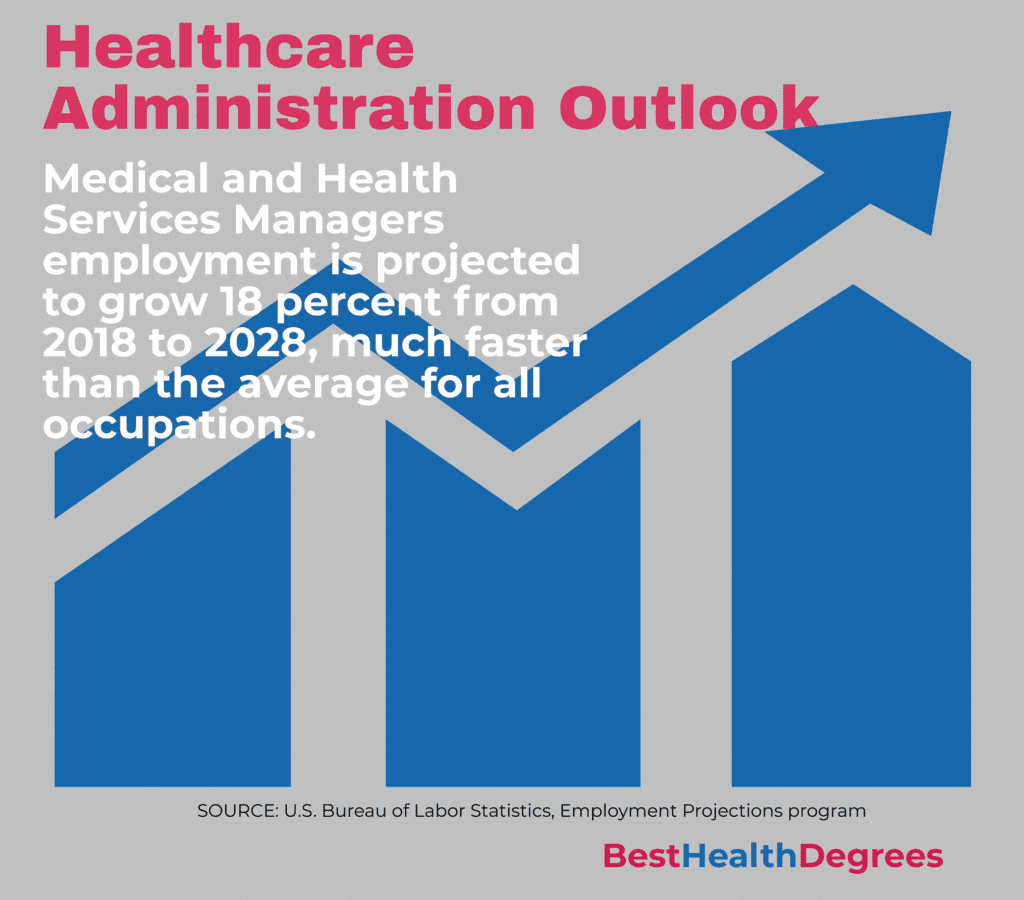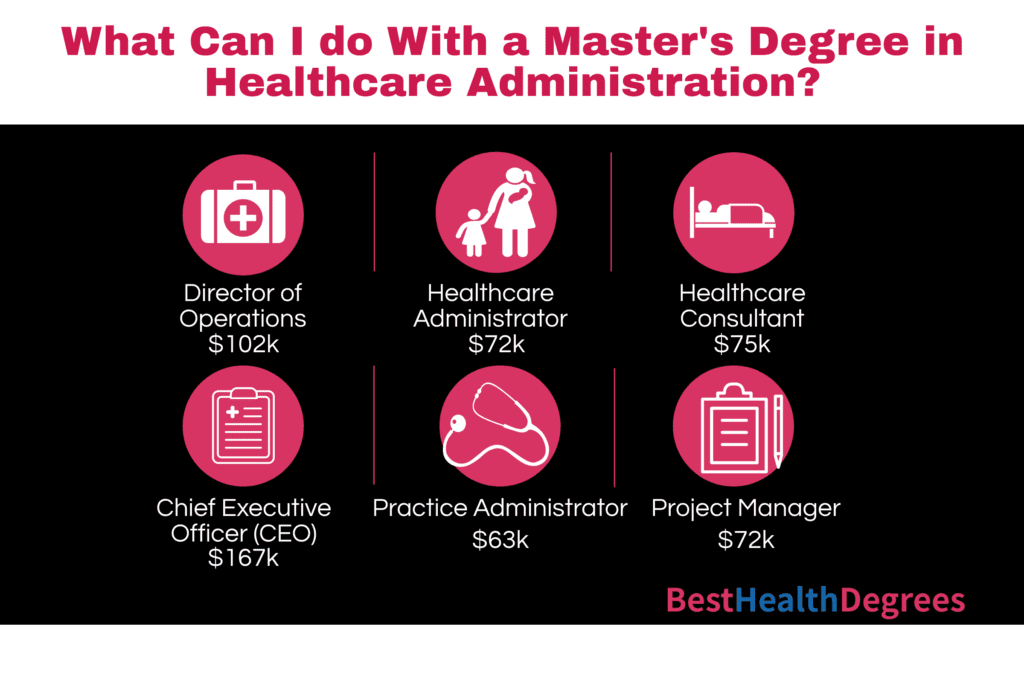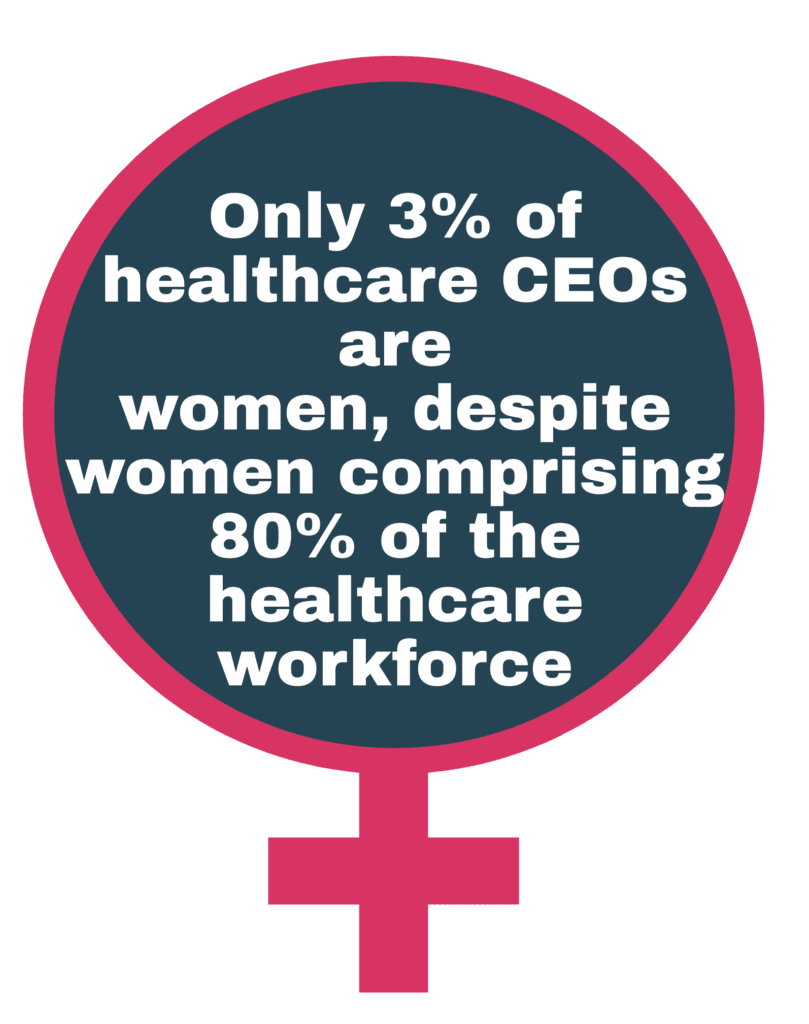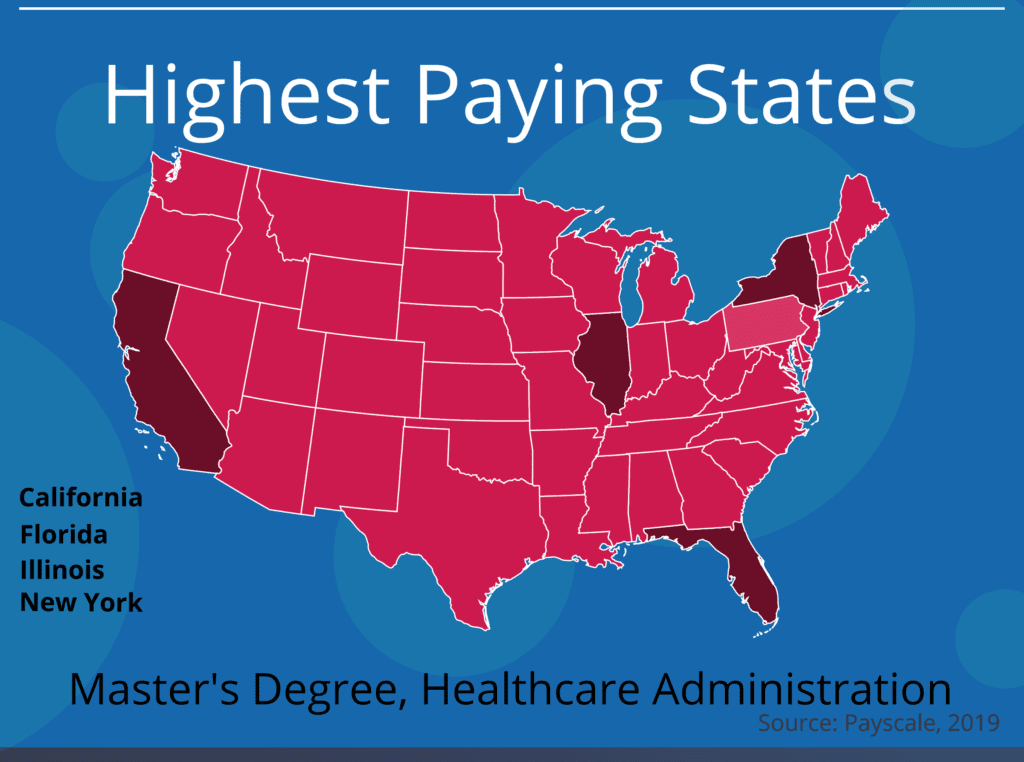Key Takeaways:
- An MHA degree opens doors to various roles within the healthcare sector, including hospital management, health insurance, and long-term care facilities.
- Ensuring the program is accredited is crucial as it guarantees the education meets certain standards and is recognized in the professional healthcare community.
- Beyond the degree, professionals might pursue specific certifications or licenses to enhance their credentials and specialization in the field.
For those who are considering a career in the Health Administration industry, find themselves wanting the answers to the following questions about a graduate degree – like a Master of Health Administration in the health care industry:
- What can you do with a masters in healthcare administration?
- Is MHA degree worth it?
- What is health care administration?
- Is a masters in healthcare administration worth it?
These questions are quite relevant when fine-tuning one’s career objectives. On a more personal note, students vying for a graduate degree in healthcare (i.e. Master of Health Administration) begin to wonder — What can I do with an MHA? How can you determine what can you do with an MHA degree.

What is Health Care Administration?
Health administration is the integrative management that oversees the operation of dynamic, complex health care facilities like –
- Health care systems
- Health insurance providers
- Hospitals
- Long-term care facilities
- Nursing homes
- Pharmacies
Is MHA degree worth it for prospective healthcare administrators? Read on to answer that question.
Public Health School/Program Accreditation
Accreditation is a standardized procedure where a third-party professional oversight agency evaluates the quality of an academic degree program in accordance with a preset set of standards. Unless a program is accredited by a reputable source, it is difficult to know if the curriculum promised is the same that is delivered. An accredited school has voluntarily opened their coursework and school to be evaluated by an industry-approved oversight agency or organization. The two broad levels of accreditation are regional and specialized.
Accreditation at a Regional Level
Regional accreditation is awarded through the United States Department of Education (USDE.) The federal government’s management manages the process of regional accreditation it is most often viewed as an exalted type of accreditation.
Accreditation at a Specialized Level
Bachelor and master’s degrees in academic health science and nursing degree programs apply for certification to the industry sanctioned oversight and accreditation organizations. This entails following a pre-determined process that requires full access to the school and the program’s details.
The Commission of Accreditation of Healthcare Management Education (CAHME)
Students entering CAHME accredited online MHA programs have legitimate assurance regarding the content, high standards of quality and a global network. CAHME accredited online MHA programs offer the opportunity for degree candidates to graduate with the skills required of a Master of Health Administration degree-holder.
The Commission on Accreditation of Allied Health Education Programs
The Commission on Accreditation of Allied Health Education Programs (CAACHEP) is a federally sanctioned accreditation organization — recognized by the Council for Higher Education (CHEA).
To date, the Commission on Accreditation of Allied Health Education Programs has awarded accreditation standards for more than two thousand health science entry-level degree programs.
The Accrediting Bureau of Health Education Schools (ABHES)
The Accrediting Bureau of Health Education Schools is tasked with the responsibility of serving the health care industry by evaluating a school or health science program against a set of pre-established industry standards.
The Accrediting Bureau of Health Education Schools’ ethos can be explained as follows –
- Endorse and promote ethical practices throughout the health care industry.
- Establish acceptable minimum standards to be used to determine the quality of health science programs.
- Raise the quality of training & education in the many facets of the health care industry.
Types of Master of Health Administration — MHA Degree Programs
A master’s in healthcare administration degree is a diversified degree as it can be applied to the many facets that make up the health care industry and healthcare organizations. A Masters Healthcare Management degree program is often available online or a hybrid delivery format. Consider these Healthcare Administration Masters programs:
- A Masters in Healthcare Management degree program
- Healthcare Administration Masters programs
- Executive MHA programs
- Masters in Healthcare Administration programs
- A Master of Science in Healthcare Administration
- Health Administration Masters programs
For those who hold a Masters of Health Administration degree, healthcare administration graduates should know that the healthcare industry is a growing industry with many management and executive-level career paths. While many professionals may begin with a bachelor’s in healthcare management, the healthcare field is becoming more and more competitive every day. An Online Master of Health Administration degree can help you stand out, especially if you are looking to advance within the private healthcare sector.
There are many top Healthcare Administration graduate programs offered by some of the most acclaimed top schools for Masters in Healthcare Administration. The Masters in Healthcare Administration requirements differ depending on the emphasis or concentration you choose to study when enrolled in the many quality Masters in Healthcare Management degree. The following Masters of Health Administration degree programs offer many degree options to meet the growing demands of the healthcare community.
Consider the following Health Administration Masters programs as you begin to research MHA degree programs or executive Master of Health administration degree programs.

Masters Healthcare Management Career Path Opportunities
Masters in Healthcare Administration programs available from some of the top healthcare administration graduate programs include the following:
Health Administration Masters Programs in Informatics — The Masters in Healthcare Management programs designed to prepare students for careers as an informatics executive Master of Health Administration; that trains degree graduates to integrate technology, mathematics and information in the ongoing valuable field of health care informatics. Many Masters of Health Administration in Informatics find they have a clear path to positions of leadership.
The Masters in Healthcare Management degree program with a specialty in finance — The Masters in Healthcare Administration requirements for a finance specialty will differ from the other available Healthcare Administration Masters programs with varying concentrations and specialties. Like any business, the management of finance is key to organizational success. Graduates who hold a Masters of Health Administration are often significant team members in Human Resources, and even sales.
Healthcare Administration Masters programs are also available with a Hospital Management specialty. Hospital management and administrators are most often the leaders of medical facilities and within government oversight agencies. A Masters in Healthcare Management hospital management holder is well schooled in finance, organizational policies and behavior and employee management.
Master of Health Administration– Online Healthcare Masters Programs
There are many and varied online MHA programs. While the schools that offers a Masters in Healthcare Administration online vary, together they offer some options for online MHA programs:
- Online MHA programs – No GRE required
- Masters in Healthcare Administration online with a specialty emphasis in finance, hospital management or informatics
- Master of Science in Healthcare Administration
- Online MHA programs.
- Masters Healthcare Administration online
Some of the most affordable online MHA programs available today are online Healthcare Master’s degrees. These online MHA programs No GRE or Masters of Science in Healthcare Administration degree programs offer significantly reduced tuition costs; making the cost of obtaining your Masters in Healthcare Administration online considerably more cost-effective.
Should I Get an MBA Instead?
From an uneducated perspective, a Master of Health Administration (MHA) degree closely resembles a Master of Business Administration (MBA). Because the MHA vs MBA debate has yet to be fully vetted and decided, so, as a result many students truly need to know the answer to the MHA vs MBA ongoing debate, including knowing the difference between an MHA vs MBA salary.
The primary difference between an MHA vs MBA degree is that the Master of Health Administration degree program prepares degree graduates in a more immersive heath care industry.
The confusion is often aggravated by the fact that a Master of Business Administration degree program includes a specialty in healthcare management. Some highly motivated students choose to earn an MBA MHA dual degree. The MBA MHA dual degree requires a serious commitment but offers a faster path to a dual degree when studied simultaneously.
Of course, the MHA vs MBA debate almost always includes an analysis of the comparison of a MHA vs MBA salary and compensation package.

Certifications/Licenses in Healthcare Administration and Management
One of the ways to elevate your health care administration career path is to reach for what the American College of Healthcare Executives (ACHE) offers — a distinct board certification awarded to those who pass the Fellow of the American College of Healthcare Executives (FACHE) examination. Healthcare administration careers are best with certification.
According to ACHE’s Board of Governors, the Fellow of the American College of Healthcare Executives (FACHE) credential assures the credential holder has demonstrated the knowledge, skills, insight and talent to be a healthcare industry leader. For those healthcare management professionals who wish to prepare to sit for the FACHE exam, it is important to recognize just how helpful and informative health administration internships can be. In addition to the amazing insight and confidence that is provided through health administration internship, those vying for a FACHE credential can brush up on healthcare topics by completing the many hospital administration courses online.
Master of Health Administration (MHA) — Health Information Certification
The American Health Information Management Association (AHIMA) offers certification for those health care professionals who help manage a facilities’ revenue cycle. There are several exams, which start with the Certified Revenue Cycle specialist to an Expert Revenue Cycle Executive.
Master of Health Administration (MHA) — Financial Certification
The Healthcare Financial Management Association (HFMA) — Those health care financial professionals are granted access through a membership that includes certification credentialing, digital and traditional seminars, industry-related conferences. The HFMA offers eight certifications, as follows:
- Certified Healthcare Financial Professional (CHFP)
- Certified Revenue Cycle Representative (CRCR)
- Certified Specialist Accounting & Finance (CSAF)
- Certified Specialist Business Intelligence (CSBI)
- Certified Specialist Managed Care (CSMC)
- Certified Specialist Physician Practice Management (CSPPM)
- Fellow of the Healthcare Financial Management Association (FHFMA)
- Certified Inpatient Coding Auditor (CICA)
Master of Health Administration (MHA) — Patient Access Certification
The National Association of Healthcare Access Management (NAHAM) — The National Association of Healthcare Access Management is designed to encourage best practices within the Patient Access Industry by setting standards and offering seminars, educational opportunities and certification standards to help develop subject matter expertise in the many facets of the health care industry.
NAHAM’s Certified Healthcare Access Associate Access Manager (CHAM) credential is a prudent way to enhance your professional skills and education. Earning the CHAM credential assures employers and clients that you, as a professional, have the professionals and skill that meets or exceeds industry acceptable standards.
Healthcare Administration Jobs
The health care industry is quite diverse, so there are many great opportunities for those vying for MHA jobs within the various health care employment marketplaces. Because of the many health administration jobs available, the entry level jobs in Healthcare Administration often as stepping stones to more advanced healthcare administration career options.
A Healthcare management job description will vary based upon the exact job responsibilities, the professional’s specialty (if any), and length of professional work experience. You will not be involved in direct patient care, but in the day to day operations of healthcare services. With a master’s degree, you handle the nuts and bolts of medical services. The healthcare system is complex, and a healthcare administrator makes sure facilities are running properly.
For those who have just graduated (preferably) from an accredited MHA degree program and just starting a career in Healthcare Administration, there are tremendous amounts of entry-level jobs in healthcare administration. Availability of these MHA jobs depends upon the career goals in healthcare administration that the degree seeker prefers.
Whether you are just starting a career in healthcare administration or re-entering the marketplace after earning a more advanced degree, healthcare professionals can expect strong growth and job demand in the near future.
Healthcare Administration Career Path Options
The Bureau of Labor Statistics reveals that the job growth outlook for professionals who hold an MHA degree, can anticipate impressive strong growth over the next decade. Listed below are more specific Health Administration careers and Health Administration jobs available to those seeking a healthcare administration career path:
- Analyst for an insurance provider
- Business manager for a medical office
- Chief Financial Officer of a Hospital
- Clinical Administrator
- Health Care Personnel Resource Manager
- Hospital Marketing Manager
- Human Resource Manager
- Nursing Home Administrator
- Office manager of a private practice
- Testing laboratory administrator
Remember to consider the hospital administrator jobs related to a being a lobbyist or governmental policymaker. The government healthcare management job description may differ from the health administration jobs in the private sector; however they both require the skills and talents of those who have earned their Master of Health Administration (MHA) degree.

Masters of Healthcare Administration Salary Expectations
The healthcare management degree salary (and compensation package) will vary depending on one’s level of education, years of experience, specialty training, and the specific facet of the health care industry you have chosen.
However, one can get a general idea of the median Health Administration salary by checking out the Bureau of Labor Statistics (BLS) website. According to the Bureau of Labor Statistics, Medical & Health Services Managers (the most relevant government category) have the following recent salary data:
The Medical & Health Services Managers median salary for the calendar year of 2018 was $99,730 per year. This translates to $47,95 per hour. It is safe to assume that a Health Administration starting salary will likely fall below the median yearly amount, but not every time.
In 2018, the Medical & Health Services Manager job market includes more than 400,000 working professionals across the country.
The Bureau of Labor Statistics’ professional statisticians anticipate the job growth pace of the Medical & Health Services Manager job market through 2028 to be 18%, which is much faster than the average of all occupations in the United States. This will add an approximate increase in jobs for the Medical & Health Services Manager job market — about 71,000 more jobs are expected, which also includes an anticipated health administration salary increase due to the stronger demand.
When comparing Healthcare Administration vs. Healthcare Management salary variations, many times the differences can be attributable to job location differences. The following lists offer the highest healthcare management degree salary by state, and by metropolitan area.
Top Paying Masters in Healthcare Administration Salary — by State
- Washington, DC: $145,760
- New York: $143,030
- Massachusetts: $133,900
- Delaware: $131,260
- Connecticut: $129,480
Top Paying Healthcare Administration Salary — by Metropolitan Area
- Vallejo-Fairfield, CA: $157,240
- Cape Girardeau, MO-IL: $148,010
- New York, NY: $141,580
- Salinas, CA: $140,870
- Boston-Cambridge, MA, NH: $140,700
Professional Organizations
Most industries have one, or many professional organizations that offer members and professionals of that profession easy access to industry insight, tools of the trade and regular networking events, among others. Industry experts, healthcare leaders, and any other member willing to contribute to the betterment of the profession are tasked with the responsibility of managing professional organizations.
Many industries are unilaterally focused and only have one or two to help enhance and promote the profession. From an overall perspective, professional organizations offer its members the following benefits:
- Credentialing and education opportunities
- Industry Conferences to bring professionals together from all over the country, and the world
- Job Boards
- Mentorships
- Networking events
- Online professional guidance
- Research Access
The Healthcare Industry has many professional organizations to select from. While all the professional organizations seek to promote and advance the health care industry, each specific professional organization caters to a specific slice of the healthcare industry professional population or job category, and therefore, offers different benefits.
Healthcare professionals should consider a membership in one of the following healthcare-related professional organizations:
The American College of Healthcare Executives (ACHE) — The 45,000+members of the American College of Healthcare Executives are automatically enrolled in one of the 75+ chapters of ACHE across the country — for no additional fee. These American College of Healthcare Executives are matched with more localized chapters that provide professional series career tools, volunteer opportunities in the local community, networking events and career techniques. Annual dues are $160 each year for membership years 1 and 2, $265 for membership years 3 – 5 and $345 for each year after your sixth year of membership. Members are eligible to sit for the FRACHE examination credential.
The American Association of Healthcare Administrative Management (AAHAM) — The American Association of Healthcare Administrative Management is one of the top professional oversight organization dedicated to supporting the mission of healthcare managers (and their employees) tasked with leading professional Healthcare facilities. Management. Some AAHAM benefits include –
- Social networks
- Job Boards
- Invitation for AAHAM’s Annual National Institute (ANI)
- Access to local hospital networking events and sites
The American Health Information Management Association (AHIMA) — The American Health Information Management Association’s mission is to maintain the ongoing and effective use of regular and digital information in the accurate and appropriate way to handle patient records and mandated paperwork. The American Health Information Management Association also provides certification tests for those dedicated to the field of health information informatics. Membership is of great benefit for those who have an interest in reaching for a career in health informatics or for those currently employed as a health information management professional.
The Health Care Administrators Association (HCAA) — The Health Care Administrators Association offers benefits and resources to healthcare professionals working as administrators to stay ahead of the curve with how to best manage and openly exchange medical information both accurately and securely. Many ancillary industry leaders choose to join — Insurance Underwriters, Healthcare attorneys, Health Care Consultants, Pharmacy Agents and healthcare facility managers.
The Healthcare Financial Management Association (HFMA) — Those health care financial professionals who hold a Master of Health Administration (MHA) gain access through membership that includes certification credentialing, digital and traditional valuable seminars, industry-related conferences — all designed to help HFMA members advance their careers in the health administration industry.
The National Association of Healthcare Access Management (NAHAM) — The National Association of Healthcare Access Management is designed to encourage best practices in the health care industry by setting standards and offering seminars, educational opportunities and certification standards to help develop subject matter expertise in the many facets of the health care industry.
Related Rankings:
- 10 Best Master’s in Healthcare Administration
- 15 Best Online Master’s in Healthcare Administration
- 10 Fastest Master’s in Healthcare Administration
- What Can You Do with a Human Service Degree?
- What are the Best Master of Health Science Jobs?
- 10 Most Affordable Master’s in Healthcare Administration
- Top 10 Online Bachelor’s in Health Administration